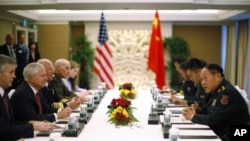U.S. Defense Secretary Robert Gates has promised Washington's allies in Asia that America will honor its commitments in the region, regardless of domestic and international pressures.
Gates made his remarks Saturday at one of Asia's most prominent security conferences, taking place in Singapore.
Gates says America's commitment to Asia will extend beyond, what he called, merely “putting boots on the ground.”
He told delegates from 27 countries at the Asia Security Summit Saturday that in the coming years, the U.S. military plans to increase its port calls, naval engagements and multilateral training with countries throughout the region.
Gates said, “America is, as the expression goes, putting 'our money where our mouth is' with respect to this part of the world - and will continue to do so.”
However, he acknowledged that he knew many in the audience were concerned that this money would be in short supply.
U.S. President Barack Obama has ordered Gates to work on cutting billions of dollars from defense spending.
Gates says the focus has been first on canceling troubled or unneeded weapons programs and culling excess overhead. He insists that U.S. military modernization will continue.
The secretary laid out in his speech Saturday how the U.S. Navy and Air Force have created a joint program to combat what he called “one of the principal security challenges” emerging - the use of new technologies and weapons to deny U.S. forces access to key sea routes and lines of communication.
Senior U.S. defense officials insist that Gates' comments were not entirely aimed at China, the region's growing military powerhouse. However, Gates has said Washington remains concerned about China’s military research projects, which include anti-ship missiles and stealth fighter aircraft.
On Friday, Gates held a nearly one-hour-long bilateral discussion with his Chinese counterpart, General Liang Guanglie. U.S. officials described the talks as “cordial” and focusing on mutual goals while acknowledging disagreements. The Chinese defense minister is Beijing's highest official ever to participate in the conference.
Adam Ward is the director of studies for the International Institute for Strategic Studies. His group sponsors the Shangri-La Dialogue.
Speaking to VOA, he says Washington is in the delicate position of figuring out how to leverage its demands in what is now a multipolar region.
Ward said, “It's about weaving Asia into a global picture, in recognizing the new players who are coming on the scene and to see to what extent benign relationships, cooperative relationships can be built even with countries like China where the relationship is infected with a certain amount of reciprocal suspicion.”
But Gates cautions people should not discount the United States just yet, even in the face of a shifting international landscape and growing domestic pressures.
The defense secretary said, “I have seen firsthand the staying power and adaptability of America over the course of my life. Indeed, history’s dustbin is littered with dictators and aggressors who underestimated America’s resilience, will and underlying strength.”
This is Gates' fifth and final Asia Security Summit as U.S. defense secretary before he steps down on June 30.
Next week, he heads to Brussels for the NATO defense meeting, where participants are expected to discuss the alliance's actions in Libya and Afghanistan.




